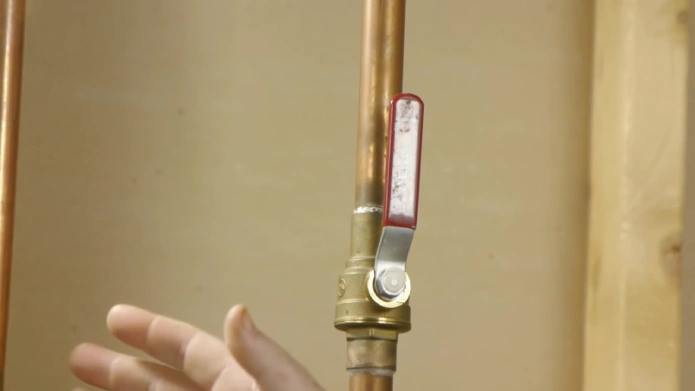Last Updated on May 7, 2023
Having a reliable sump pump is crucial when it comes to keeping your home safe from floods and water damage. But your sump pump won’t do you much good without a dependable power source. That’s where deep-cycle marine batteries come in.
Deep-cycle marine batteries are designed to provide a steady and long-lasting stream of power that is perfectly suited for powering sump pumps. They are efficient and incredibly dependable, ensuring that your sump pump will have the power it needs when you need it most.
Today, let’s explore the advantages of using a deep-cycle marine battery to power your sump pump. We’ll cover everything from sizing recommendations and runtime estimates to other essential details below, so you can decide whether this is the right option.
Can I Use a Deep Cycle Marine Battery In My Sump Pump: 5 Reasons

Opting for the most suitable battery for your sump pump is critical. This decision may allow it to continue to run even if there is a prolonged power outage. Deep-cycle marine batteries are typically known as the go-to option, offering you numerous perks.
You should use a deep-cycle marine battery for these reasons:
Durability and Longevity
Deep cycle marine batteries have fewer, thicker plates than regular starting batteries, allowing them to discharge and recharge multiple times without significant capacity loss. Additionally, deep-cycle marine batteries have a cycle life or cycle rating, which indicates the number of cycles before capacity is reduced to 80%.
The durability and longevity of these types of batteries make them an excellent choice for sump pumps, as they can be relied on to provide reliable power during a power outage or flooding event.
Ability to Provide Continuous Power
Deep-cycle marine batteries are specifically designed to provide continuous power output. Unlike starting batteries which produce short bursts of high energy, deep-cycle marine batteries will steadily provide energy over extended periods.
Making them particularly useful in the context of sump pumps, whose primary purpose is keeping flooding at bay during a power outage. Deep-cycle marine batteries are ideal for sump pump applications with their continuous power output.
Ability to Handle Deep Discharges
Deep cycle marine batteries are designed to handle deep discharges of up to 80%, while standard starting batteries have a maximum discharge capacity of 50%. This means that if power outages occur, the deep-cycle battery can continue powering the sump pump, whereas a regular starting battery would not.
Furthermore, deep discharges can significantly damage starting batteries and reduce their lifespan. In contrast, a deep-cycle marine battery is built for such deep discharges and so suffers no damage or degradation in performance.
Can Be Recharged Multiple Times
Deep-cycle marine batteries can be recharged multiple times without damaging or reducing their performance or lifespan. This makes them ideal for homeowners who rely on their sump pumps during power outages, as they can be easily recharged after long periods of use.
Also, they have a longer lifespan than other types of batteries due to their ability to withstand multiple charge cycles without degradation in performance.
Resistance to Sulfation
Sulfation is a natural process in lead-acid batteries that occurs when they are discharged below a certain voltage and left for extended periods. This reduces the lifespan and performance of regular batteries, but deep-cycle marine batteries are much more sulfation-resistant.
The result is that they maintain their charge and capacity over long periods, even when subjected to intense cycles of discharging and recharging.
How Big Should a Deep Cycle Marine Battery Be For Sump Pumps?

Choosing the right deep cycle marine battery for your sump pump can be a daunting task, especially if you are not familiar with the technical specifications. The key to making the right decision is to pay attention to the manufacturer’s requirements and specifications.
A battery’s Amp-Hour rating is a critical factor in determining how much energy it can store and its overall longevity. To get the most out of your new purchase, choose one with an AH level as close to maximum capacity as possible, recommended by the manufacturer, for the best results.
For most backup sump pumps, this rating should be around 120 AH, although lower ratings may also be sufficient depending on the specifics of the application. This will ensure that your battery can supply the required power to your sump pump for an extended period without running out of juice during a storm.
It is also essential to consider other factors when selecting a suitable deep-cycle marine battery. These factors include operating temperature range, charge/discharge rate, voltage capacity and power output. It needs to be able to handle frequent discharging cycles and have thermal runaway protection.
How Do You Maintain a Deep Cycle Marine Battery in a Sump Pump System?

Deep-cycle marine battery maintenance is essential to ensure it’s operating efficiently and safely. Keep your battery running smoothly with these tips:
Regularly Inspect the Battery: Keeping an eye on your battery is the best way to guarantee it runs well for as long as possible. Inspect the battery for any signs of wear and tear, including corrosion or damage. Also, ensure it’s securely mounted in the housing and its terminals are corrosion-free.
Charge the Battery: Usually, deep-cycle marine batteries need to be charged every two to three weeks, depending on their capacity and usage. You can prevent your battery from going flat and avoid needing expensive repairs by charging it regularly.
Use the Right Charger: It’s essential that you use a charger specifically designed for deep-cycle marine batteries rather than a regular charger. This will prevent any unnecessary damage to your battery.
Use Distilled Water: Topping up with distilled water is critical when maintaining a sump pump’s deep-cycle marine battery. Avoid tap water or any other type of water as it can cause mineral buildup, damaging your battery over time.
Test the Battery: Using a multimeter or a specialized tester tool is another excellent way to get an overall health check of your battery. This will enable you to diagnose issues before they become too severe and costly to repair.
Replace Your Battery When Necessary: If your battery isn’t holding a charge or shows signs of damage, it’s time to replace it with a new one. Deep-cycle marine batteries usually last 3-5 years, although this number can vary depending on usage and maintenance habits.
Can You Pick a Reliable Deep Cycle Marine Battery Online?
Technology has made it simpler than ever to access reliable deep-cycle marine batteries. No more trawling hardware stores when you can simply find the perfect battery online. Shopping for essential boat supplies is now easier and faster with a few clicks of your mouse.
Online buyers have access to a wide variety of high-quality brands, which increases their chances of finding one that meets their needs. Customers can find the battery with the best features and specifications for their specific application and purchase it at a competitive price.
When shopping for a deep cycle battery online, customers should take into consideration some important factors such as capacity (in amp hours), charge rate (in volts), size (in inches) and weight (in pounds). It is also important to read customer reviews thoroughly before making any purchase.
If you want to buy a good deep-cycle marine battery, check out our best deep cycle battery for sump pump guide for more information. We have extensively researched to provide you with the best product recommendations in the market.
How Long Can a Deep Cycle Marine Battery Power a Sump Pump?

A deep-cycle marine battery can power a sump pump for extended periods, depending on the frequency of use and amount of power consumed. Generally speaking, a marine deep cycle battery can last up to 7-8 hours of continuous pumping and 2-3 days of non-continuous pumping.
Powering a sump pump with a marine battery requires monitoring to ensure long-term usability and keep the device running. One must pay close attention to how much of its power is being used. Recharging it regularly will help extend its life expectancy, so make sure not to let your battery’s juice run dry.
Getting a charger made for deep-cycle batteries is also essential to maximize efficiency and performance. Given proper maintenance and usage guidelines, deep-cycle marine batteries can provide reliable and prolonged operation for your sump pump needs.
Can You Run a Sump Pump With a 12 Volt Deep Cycle Marine Battery?
You can power up a sump pump with reliable bursts of current from 12-volt marine batteries. A durable option perfect for all sorts of electrical equipment, these batteries effectively keep your home dry and free from flooding damage.
However, it’s essential to determine the power requirements of your specific pump to ensure that your battery has enough capacity to operate it without running out of juice quickly. You’ll want to choose a battery with a rating of at least 50 to 100 amp hours to provide this steady stream of power.
Don’t forget to double-check that the voltage of your battery matches that of your sump pump, either 12 or 24 volts, to avoid damaging your equipment. A properly matched and powered 12-volt deep-cycle marine battery can be an excellent solution for running your sump pump.
Power Up Your Sump Pump with Deep-Cycle Marine Batteries
When it comes to powering your sump pump, deep-cycle marine batteries are the way to go. Unlike other power sources that may lack efficiency and longevity, these reliable batteries provide a powerful output that you can count on.
The latest technological advances have truly revolutionized the deep-cycle marine battery, making it a go-to choice for many homeowners. Boasting higher capacity and longer lifespans than ever before and requiring less maintenance too, these batteries are now delivering unbeatable power to homes all around the country.
So why settle for anything less when you can power your sump pump with the best? Consider investing in a deep-cycle marine battery today and enjoy its many benefits.



